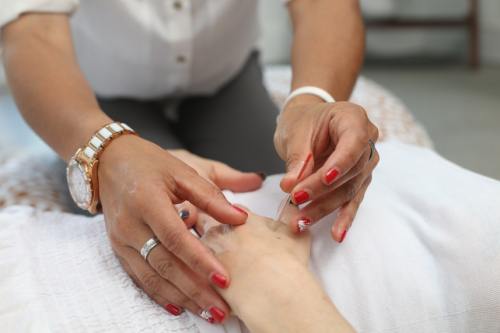What every woman with tweaky hormones needs to know about acupuncture
Learn about how you can use Chinese medicine and acupuncture for hormone balance, according to fertility expert Jill Blakeway, DACM.

Acupuncture has long been a popular treatment for infertility, but now, women are gravitating toward Chinese medicine for overall hormonal help. “Over the past few years, I’ve noticed a change; a movement, particularly amongst younger women, to take charge of their cycles long before they want to start a family,” says Jill Blakeway, DACM, a licensed and board-certified acupuncturist and clinical herbalist in New York City. (As evidence of the growing popularity of these treatments, note this: Her clinic, the Yinova Center, has just raised a round of seed funding, which it will use to open new clinics and build out its product and digital offerings.)
Among these acupuncture newcomers are women looking for natural ways to handle perimenopause and menopause; younger women challenged by the effects of synthetic birth control; and, basically, women who simply feel like their hormones are off-kilter. “Women understand that their cycles affect their whole body,” Blakeway says. “They know that their mood swings are related to their hormones or that their fatigue is particularly acute at a certain point in their cycle. They are seeking out practitioners who also see them as whole people and treat them accordingly—and that often leads them to Chinese medicine.”
Curious to see if acupuncture could help you restore hormonal balance? Here are 4 things to know.

Acupuncture can help with a host of problems
You might have heard positive things about how acupuncture can work as a fertility treatment. “Chinese medicine has a well-deserved reputation for being able to enhance fertility for both men and women,” Blakeway says. But its hormone-helping powers don’t end there. Acupuncturists can help women with issues including PCOS, amenhorrhea (when you miss more than three periods), painful periods, and endometriosis. In addition, Blakeway adds, they can address hormonal imbalances that lead to acne, migraines, or low libido. While each person’s situation is different, she notes that treatment is relatively quick: “Most hormonal imbalances are solved in two or three months, although more serious issues can take longer and require a combined Western and Eastern approach.”
Many issues can be connected to your hormones
Along with cramps and irregular timing, there are some issues you may not have connected with your menstrual cycle. “I think women have been taught to ‘suck it up’ and not complain about their cycles; to power through quietly. I disagree,” says Blakeway. “We’re rhythmic, but that shouldn’t cause us discomfort or get in the way of our ability to perform.”
She recommends seeking an acupuncturist for any symptom that coincides with your cycle’s rhythms. For example, she says, many women experience changes in their bowel movements before and during their periods. “Some women get constipated before their period starts and then suffer from diarrhea during the period,” she notes. “This is a sign of a minor imbalance that can easily be fixed by using the tools of Chinese medicine to address the effect of reproductive hormones on the digestive system.”
Treatment is personalized…and specific to you
Think of an acupuncturist and you probably picture someone working with small needles to improve your body’s qi, or energy flow. That’s definitely true, but not the entire story. “Acupuncture is part of a whole system of medicine that includes acupuncture, herbal medicine, bodywork, dietary changes, and lifestyle advice,” Blakeway says. “That system has been used for thousands of years to treat women’s reproductive problems and support women in pregnancy and childbirth.”
If you choose acupuncture to help with your hormonal issues, your practitioner should be able to get a sense of what your unique hormonal challenges are. At the Yinova Center, Blakeway and her colleagues create specific herbal formulas for each patient. “That’s important because no two hormonal imbalances look the same,” she notes. Nor are they treated the same.
Your practitioner’s background matters
When you go to choose an acupuncturist, look for a licensed and board-certified practitioner. “Acupuncturists in the US are well-trained,” says Blakeway. She notes that in most states, acupuncturists complete a four- or five-year master’s degree or doctorate, plus take medical board exams. And, she adds, working with an acupuncturist doesn’t mean you have to—or should—abandon Western medicine. “Modern acupuncturists are trained to integrate their treatments with the conventional care their patients are receiving, minimizing drug-herb interactions and maximizing the benefits of integrative care,” she notes.
For gynecological issues, Blakeway advises choosing an acupuncturist who is board-certified in herbal medicine and acupuncture. “Herbs are an important part of treatment,” she says. “An experienced practitioner knows how to source good-quality herbs that are safe and effective.” In addition, look for a practitioner who’s eager to help you learn how to troubleshoot your own cycle. “The goal of treatment should not be to make you dependent on acupuncture to manage your cycle,” Blakeway says, “but to help you get to a place where you don’t need it.”
There’s so much more that acupuncture can do. Here’s what Chinese medicine has to say about lumpy boobs—and super-charging your sex drive.
Sign Up for Our Daily Newsletter
Get all the latest in wellness, trends, food, fitness, beauty, and more delivered right to your inbox.
Got it, you've been added to our email list.










